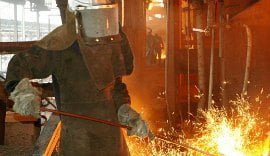Structural steel workers at Severfield Watson Structures in North Yorkshire and Lancashire succeeded this August in defending their terms and conditions against attacks from their employer. Socialist Appeal supporters from the GMB union – who help to organise the Severs steel workers – report on this latest successful struggle.
Structural steel workers at Severfield Watson Structures Ltd (formerly Severfield Reeve Structures) succeeded this August in defending their terms and conditions against attacks from their employer. The employer, Severfield Rowen PLC, now with its new directorship in place from the recent merger of two of its factories, at Dalton Thirsk, North Yorkshire and Lostock Bolton, Lancashire, backed down under pressure from the workers.
In May the workers at both sites were consulted regarding changes to their terms and conditions of employment. These plans involved redeploying half of the night shift onto day shift, plus a reduction in overtime premiums and the removal of their 80p hourly attendance bonus. It was quite clear from the start that the reasons for the attacks were unjustified irrespective of the company’s financial position, one that has been publically reported by the media, as ‘director and managerial inefficiencies’.
The company went to a share issue in April, which boosted the company’s financial position by £48m, providing reinstalled confidence with its lenders. This, with its concomitant restructuring of bosses, was then the opportunity to start with a programme of cuts.
But the rank and file at Dalton were not willing to sit back. Over the last four years they have organised themselves under the banner of the GMB. The GMB committee, made up of organisers and safety reps, challenged the legitimacy of the cuts over the following months. A 100% unanimous straw poll of GMB members in favour of an industrial action ballot laid the platform for worker solidarity.
On hearing this, the company challenged the legitimacy of such an action taken during consultation. The reps immediately defended this on the grounds that the decisions to change contracts were adumbrated in the consultation document. The reps presented the case, to which the company had no defence.
With the goal posts continually moving, the irregularities of their own procedures started to show and were immediately capitalised on by the GMB committee; the redeployment of night shift to day shift was then put on hold. More work was needed to plan a strategy and communicate this with the GMB members. The rights to union duties were full on, and needed to be backed by support from the workforce, making it harder for the bosses to challenge in light of all the rank and file tub-thumping.
Now there seemed to be a split in the management over opinion whether the cuts were necessary or not, and the rank and file picked up on this immediately, passing their views straight back to the union committee.
Timetables were then being overrun, as the company felt it had given enough consultation time, but they hadn’t expected the solid results of the straw poll and a solid unity of opinion from the workers.
Efforts to challenge the way in which the GMB organisers were communicating to their members were starting to become evident, but proved inneffectual; attempts to introduce hearsay were nothing but wasteful.
GMB committees from both factories pushed for collective talks to show solidarity. This proved an unwelcome turn of events that the bosses could have done without. It posed a problem: not only were both factories on different terms that the company were trying to cut, but now they were facing the very real threat of coordinated action.
Wearing the company down proved once again to be effective: now the reduction of overtime premium was shelved, and with the goal posts moving more frequent than a seat on the board of directors, the workforce were buoyed by their new found confidence.
For Dalton this left the removal of the 80p attendance bonus (7% pay cut), which members had fought hard for four years ago. This was the main reason that there was support for action. The
contractual 80p attendance bonus – with its flexibility clause allowing the company to vary or remove it with one months notice in writing – was always going to need maximum support to keep. Being prepared with constructive talks with the workers, the GMB committee ramped up its defence and told the company that the GMB would prepare for a ballot for industrial action if they made any attempt to vary or remove the bonus.
Again the bosses made a further attempt to move the goal posts, dismissing the GMB’s crucial caveat against unfair changes, and proposed to vary the bonus to an attendance incentive scheme with conditions. These conditions would have imposed draconian financial detriment and punitive entitlement outside of the company’s current formal disciplinary procedures.
A ballot was fully prepared after talks came to an impasse; this was tightly organised leaving no chance for recriminations and a count policed by the management took place. The outcome of the consultative ballot was a 100% rejection of the new bonus scheme. Then the GMB was left to prepare for a ballot for strike action.
After a week of wasted efforts to convince the workforce that the cuts were necessary, the bosses had nowhere to go. The Dalton GMB organisers were summoned to the board room where they were informed there was to be a full climb down from all the changes to terms and conditions.
The GMB at the Lostock factory are still balloting strongly on their proposed changes.
After 13 weeks of consultation, talks and disputes, the bosses created a mood of militancy among the workforce. The membership now recognises its strength; organised, it will be hard to beat in the future, but for now solidarity amongst workers who are prepared to fight for their rights, was the key to stopping these unnecessary attacks.






